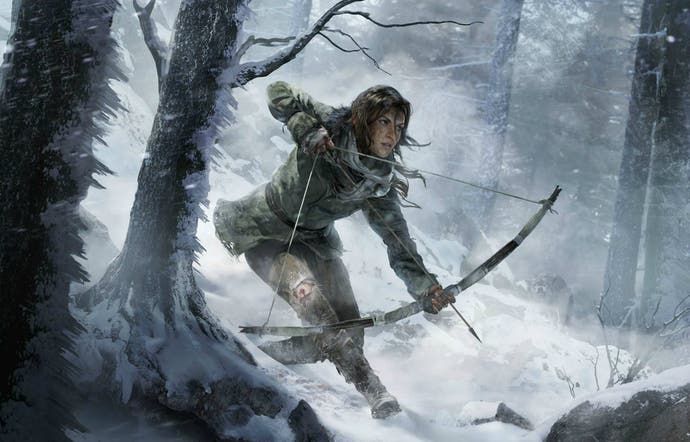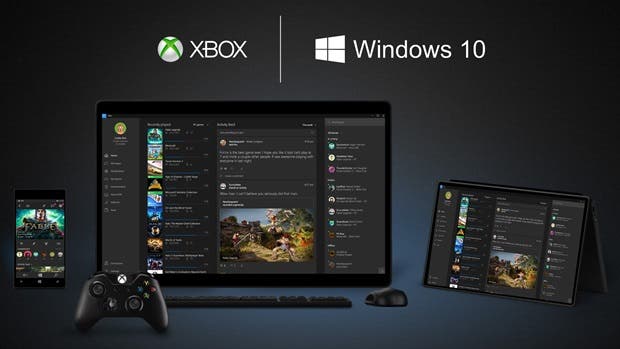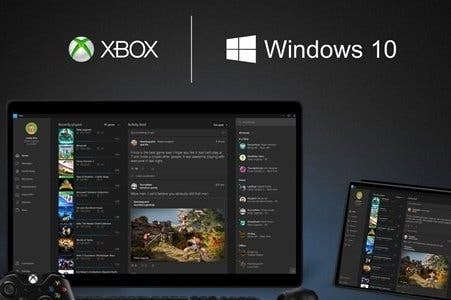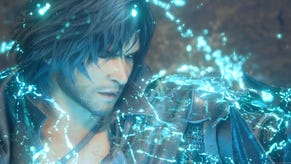Microsoft's difficult choice at E3 2015
Will Phil Spencer try to save Xbox One, or push for the cross-platform future?
Over the next few days we'll be looking looking at the fortunes of the major players who'll be holding press conferences at E3 - each of the three platform holders, and a roundup of the bigger publishers. We'll be looking at where these companies are, where we think they're going, and how they're going to use gaming's glitziest stage to get there - as well as making a few informed predictions.
First, and arguably most fascinating, is Microsoft. Xbox One is still trailing PlayStation 4 by a wide margin in global sales and struggling to differentiate itself, or to make up for the price and power disadvantage it started at back in late 2013. Talk that the software giant is trying to sell off its Xbox division refuses to go away - although it's hard to conjure the name of a buyer with the means and motives to take it on. Division head Phil Spencer and his team know that this E3 is a crucial moment for the entire Xbox project as they wind up for a make-or-break last half of 2015.
They do have a golden opportunity, though. Their rivals at Sony, having delayed Uncharted 4 into 2016 and barring any late surprises, are facing their second Christmas in a row with a slender roster of exclusive games. Faced with this open goal, Microsoft is taking no chances, and we have long known that Halo 5: Guardians, Forza Motorsport 6 and a timed exclusive on Rise of the Tomb Raider are lining up to take a shot. It's a solid line-up: big brands, big money, big gaming. These games will all feature heavily on Monday. Their trailers will look good and their release dates won't slip. If you're going to spell out the reasons to buy a game console in famous franchises - punctuated, one assumes, with a habitual tickle of exclusive Call of Duty and FIFA content - it's about as sobering an argument as you can get.
Sober is the word, though. Or you could use solid, or sturdy. Despite their huge name-recognition power, there's something curiously unsexy about this trio. The shine has unquestionably come off Halo, once one of the most thrilling names in gaming; the jury was still out on 343 Industries' debut Halo 4 when last year's launch of The Master Chief Collection went so disastrously wrong. And the mercenary deployment of a beloved multi-platform franchise like Tomb Raider hasn't gone down so well with cynical veteran gamers who still remember the first console wars (like me). It's as well that it's time to focus on the substance of these games now, because both have taken some PR knocks and have plenty to prove.

If their wow factor is questionable, and surprise factor negligible, what can Spencer and co use to lend their bluntly effective offensive a little of the pizazz that E3 pundits love? We've already heard about a new 1TB console and minor price adjustment, so it won't be a price cut or new hardware. Game-wise, we'll certainly see something new, or new-ish: it might be the Gears of War remaster, or Rare's next game, or both, or something else entirely. Rare's allure is battered too, but the studio has been so long dormant as a creative force that a proper revival could summon a real nostalgic thrill. Even if its game is a long way off - Microsoft's 2015 dance card looks pretty full already - it could be a great PR win for E3. (We don't expect to see much of the somewhat motley collection of surprises Microsoft touted last year: Crackdown is still only in the earliest stages of development, and the hardcore play of Platinum's Scalebound is, sadly, probably not worth the running time two years in a row.)
But it's quite possible that we won't see the key to Microsoft's future in games during its habitual Monday morning Xbox briefing. Because, in a little-heralded but potentially very significant move, that won't be the only time Xbox takes to the stage at E3 this year. It's also an official sponsor of the PC Gaming Show,
This event, taking place on Tuesday evening, is an attempt to give the PC platform the voice it has always lacked at E3. Many, including Valve's Gabe Newell, have bemoaned the fact that PC gaming's voice is drowned out by the marketing blitzkrieg of the console giants at E3, and that this isn't a fair reflection of the games industry. That's certainly been true in recent years, with the PC scene enjoying such rude commercial and creative health. Yet until now, and despite some failed initiatives like the PC Gaming Alliance, no-one has stepped up to rectify this - perhaps because E3 is run by the Entertainment Software Association, a US body dominated by big publishers who typically have a smaller stake in PC gaming.
It's fallen to PC Gamer, the great Future Publishing website and magazine, to pull this event together (which is fitting, if you remember Graham Smith's fantasy PC conference from a couple of years ago). They've attracted some fairly big names, like Blizzard and Dean Hall, to show their wares. And Xbox. What's going on there, then?

Early this year, Microsoft announced that, as part of the roll-out of Windows 10 in July, it would be bringing Xbox to Windows as a kind of cross-platform gaming brand. Xbox Live will be integral to Windows 10 with the ability to stream Xbox One games; there will be actual cross-platform releases such as Fable Legends and Gigantic; and Windows 10 technology - including elements of the very promising DirectX 12 graphics API - will be coming to Xbox One.
We've heard all this before, of course. It's all too easy to see Fable Legends as a retread of 2007's ill-fated PC and Xbox 360 game, Shadowrun. PC gamers burned by years of arm's-length treatment from Microsoft, not least in the form of the bloated and faulty Games for Windows Live platform, would be forgiven for exhibiting some scepticism. Why should we pay attention to Microsoft's PC charm offensive this time?
For one thing, Windows 10 is already looking like a win for gamers, with the free upgrade offer ensuring speedy take-up and DirectX 12 promising better scalability, performance, and a more competitive hardware market. For another, Microsoft's gaming division is now properly united for the first time in a long time, under the Xbox brand and under a boss, Spencer, with a true love for the medium and a true understanding of the market.
But beyond that, Microsoft has several strategic imperatives for taking PC gaming seriously and blurring the boundaries between it and its console business. One is Valve: though both sides continue to deny that they see each other as competitors, that is surely disingenuous as Valve prepares to launch its Steam Machines hardware initiative this year, which is explicitly based around cutting PC gaming's ties to the Windows operating system. Microsoft knows it has allowed Valve to own PC gaming and is now on the point of allowing it to carry it away to its own ecosystem and into the living room. The time has come to put a stake in the sand. (Valve, by the way, is notable by its absence at the PC Gaming Show, despite its huge push on Steam Machines, the Steam Controller and SteamVR this year; another open goal for Microsoft.) Then there is HoloLens, Microsoft's augmented reality headset, an alternative take on the current goggle fad that will surely seek to use games to lever its way into the public consciousness; expect that, at least, to make a primetime appearance at the Xbox briefing on Monday.

Finally, there are the struggling fortunes of Xbox One itself. As the firm starts to lose its footing in consumer gaming hardware, it must surely be thinking about how best to cut its losses in the great Xbox experiment. Turning Xbox into a more virtual, device-agnostic platform based on streaming technology will appeal to Microsoft's blue-sky thinkers (some argue that this, or something like it, is what Xbox One was all about from the start, but the strategy was blocked by the U-turn on digital DRM). In a more grounded sense, vastly expanding the potential reach of Microsoft Game Studios' generally high-quality releases by putting them on a massive platform like Windows would please the bean-counters. In his PC Gamer interview, Spencer tells it about as straight as he ever does: "The charter of Microsoft Studios is to develop games that showcase the best of every Windows device. You can absolutely count on us to invest in games for the PC. While we want to break down the walls between platforms, we also know that certain games are optimized for certain devices."
All this leaves Spencer with a difficult choice to make. Showing support for the PC Gaming Show and talking up a few cross-platform bells and whistles is one thing - and no minor gesture. But what if he were to go one further and use the company's main event on Monday to announce Rise of the Tomb Raider for Xbox One and Xbox for Windows 10? Or Forza, with cross-platform multiplayer? Or even Halo? It seems unthinkable, but you can bet someone's been thinking it.
It's not an easy decision. It could be a horrible mistake to take the focus off Xbox One when the console needs it most. Or it could be a sacrifice worth making when you're being pinched hard by Valve on one side and Sony on another. We wouldn't like to have to make it ourselves.
Whatever happens, Microsoft's position in the gaming landscape right now is unique. It faces huge challenges, but also opportunities that none of its rivals have. And even if all it does at E3 is take a small step outside the box, with its appearance at the PC Gaming Show on Tuesday, that will still be a smarter and more unexpected move than many had expected Spencer's team to make. It's all to play for.




-3-31-23-screenshot.png?width=291&height=164&fit=crop&quality=80&format=jpg&auto=webp)




